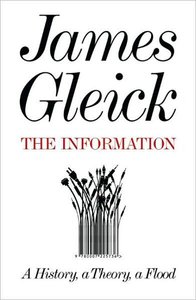 Zusammenfassungen
Zusammenfassungen
 James Gleick, the author of the best sellers Chaos and Genius, now brings us a work just as astonishing and masterly: a revelatory chronicle and meditation that shows how information has become the modern era´s defining quality - the blood, the fuel, the vital principle of our world.
James Gleick, the author of the best sellers Chaos and Genius, now brings us a work just as astonishing and masterly: a revelatory chronicle and meditation that shows how information has become the modern era´s defining quality - the blood, the fuel, the vital principle of our world. The story of information begins in a time profoundly unlike our own, when every thought and utterance vanishes as soon as it is born. From the invention of scripts and alphabets to the long-misunderstood talking drums of Africa, Gleick tells the story of information technologies that changed the very nature of human consciousness. He provides portraits of the key figures contributing to the inexorable development of our modern understanding of information: Charles Babbage, the idiosyncratic inventor of the first great mechanical computer; Ada Byron, the brilliant and doomed daughter of the poet, who became the first true programmer; pivotal figures like Samuel Morse and Alan Turing; and Claude Shannon, the creator of information theory itself.
And then the information age arrives. Citizens of this world become experts willy-nilly: aficionados of bits and bytes. And we sometimes feel we are drowning, swept by a deluge of signs and signals, news and images, blogs and tweets. The Information is the story of how we got here and where we are heading.
 Dieses Buch erwähnt ...
Dieses Buch erwähnt ...
 Personen KB IB clear | Charles Babbage , Stephen R. Graubard , Leibniz , Claude Shannon , Alan Turing | |||||||||||||||||||||||||||
 Begriffe KB IB clear |  Anthropomorphismus
, Chaostheoriechoas theory
, Anthropomorphismus
, Chaostheoriechoas theory
,  Cholera
, Darwinismusdarwinism
, Faschismus
, Informationinformation
, Informationstheorieinformation theory
, Pheromone
, Phylogenese
, survival of the fittestsurvival of the fittest Cholera
, Darwinismusdarwinism
, Faschismus
, Informationinformation
, Informationstheorieinformation theory
, Pheromone
, Phylogenese
, survival of the fittestsurvival of the fittest
| |||||||||||||||||||||||||||
 Bücher |
|
 Dieses Buch erwähnt vermutlich nicht ...
Dieses Buch erwähnt vermutlich nicht ... 
 Nicht erwähnte Begriffe | Ontogenese |
 Zitationsgraph
Zitationsgraph
 Zitationsgraph (Beta-Test mit vis.js)
Zitationsgraph (Beta-Test mit vis.js)
 Zeitleiste
Zeitleiste
 12 Erwähnungen
12 Erwähnungen 
- Theories of the Information Society - 4th Edition (Frank Webster) (1995)

- Das Megatrend-Prinzip - Wie die Welt von morgen entsteht (Matthias Horx) (2012)

- Die 4. Revolution - Wie die Infosphäre unser Leben verändert (Luciano Floridi) (2014)

- How We Got to Now - Six Innovations That Made the Modern World (Steven Johnson) (2014)

- Beyond Zero and One (Andrew Smart) (2015)

- Great Principles of Computing (Peter Denning, Craig Martell) (2015)


- The Stack - On Software and Sovereignty (Benjamin H. Bratton) (2015)

- The Future of the Professions - How Technology Will Transform the Work of Human Experts (Richard Susskind, Daniel Susskind) (2016)

- Wonderland - How Play Made the Modern World (Steven Johnson) (2016)

- Information and Society (Michael Buckland) (2017)

- Der Sinn des Denkens (Markus Gabriel) (2018)


- Engines of Order - A Mechanology of Algorithmic Techniques (Bernhard Rieder) (2020)


 Co-zitierte Bücher
Co-zitierte Bücher

How the Digital Revolution is Accelerating Innovation, Driving Productivity, and Irreversibly Transforming Employment and the Economy
(Erik Brynjolfsson, Andrew McAfee) (2011)

Das Wissen neu denken, denn Fakten sind keine Fakten mehr, die Experten sitzen überall und die schlaueste Person im Raum ist der Raum
Too Big to Know
Rethinking Knowledge Now That the Facts Aren't the Facts, Experts Are Everywhere, and the Smartest Person in the Room
(David Weinberger) (2012)


How blogs, MySpace, YouTube, and the rest of today's user-generated media are destroying our economy, our culture, and our values
(Andrew Keen) (2008)

A Revolution That Will Transform How We Live, Work and Think
(Viktor Mayer-Schönberger, Kenneth Cukier) (2013)


The Zero Marginal Cost Society
The Internet of Things, the Collaborative Commons, and the Eclipse of Capitalism
(Jeremy Rifkin) (2014)
 Volltext dieses Dokuments
Volltext dieses Dokuments
 Bibliographisches
Bibliographisches 
 Beat und dieses Buch
Beat und dieses Buch
Beat hat dieses Buch während seiner Zeit am Institut für Medien und Schule (IMS) ins Biblionetz aufgenommen. Beat besitzt kein physisches, aber ein digitales Exemplar. (das er aber aus Urheberrechtsgründen nicht einfach weitergeben darf).


































 Biblionetz-History
Biblionetz-History